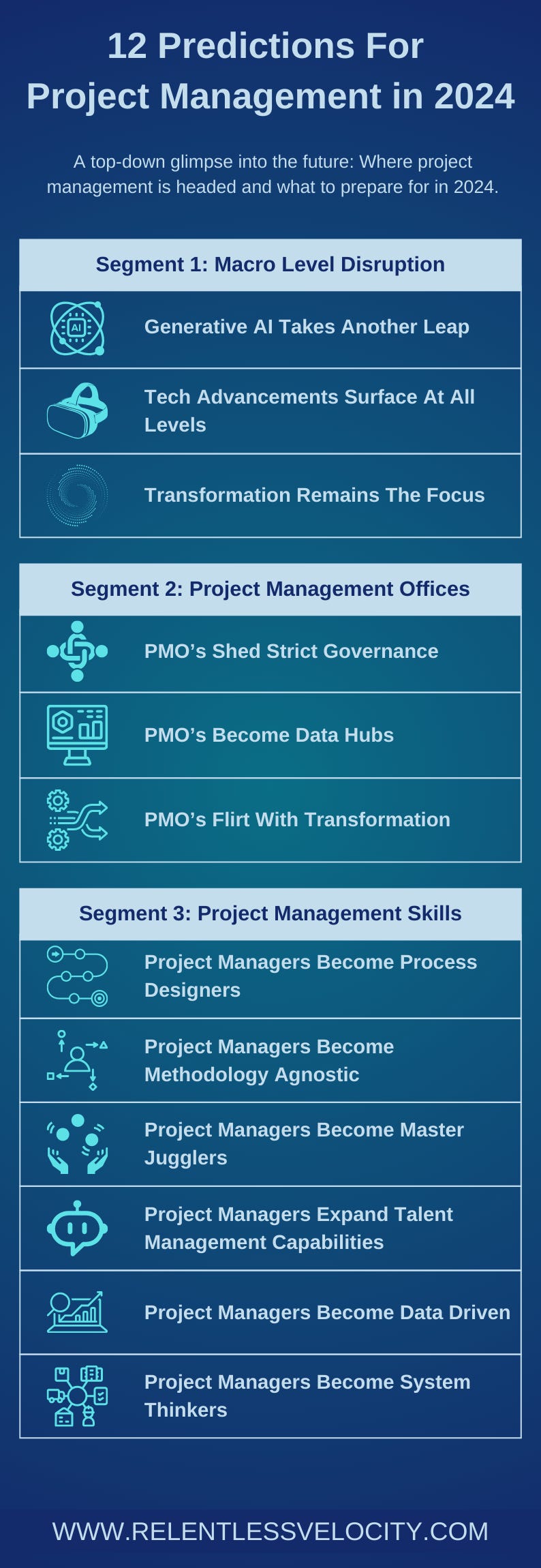2024 Predictions: What To Expect In Project Management
(#017)
It’s the end of the year, and like most of you, I’m planning on spending some time winding down and reflecting on what I learned. It’s also the perfect time to give my active brain a rest so I can head into 2024 with the right frame of mind.
But before that, I wanted to close out 2023 with something I enjoy doing, perhaps more than anything else as far as “work” is concerned. And that’s looking into the future and taking my chances making some lofty but not totally unreasonable predictions on what 2024 will look like through the lens of project management.
To keep things somewhat structured, I’m making my predictions from a top-down point of view, split up into segments:
Segment 1: Looking at changes that are happening more broadly and are least in our control. What I call Macro Level Disruption.
Segment 2: Focuses specifically at the department level. And given these are predictions centred around project management, the focus will be on Project Management Offices.
Segment 3: And finally, looking at the individual level, the core skills that will be needed by project managers to thrive in what is shaping up to be an exciting year.
Now, let’s move on to those predictions.
Segment 1: Macro Level Disruption
The first segment takes a look at large, overarching factors that can have an impact at companies at scale and the future of work in general. I look to start with a macro level view first as it sets the stage, is the least in our control and also provides a compass to the things that are.
Generative AI Takes Another Leap
When engaging in any discussion about the future of work, it's almost guaranteed that generative AI will be the main topic. And rightly so! Never before have the possibilities been so endless and exciting.
Given this fact, it’s hard to predict where growth is headed when looking at large language models as a whole. There are just so many variables that can play out. So instead of focusing on the growth in capabilities in artificial intelligence itself, I’m going to look at how companies plan on adopting these tools in 2024.
To start right away with a spoiler, it’s going to be massive.
I anticipate that companies in all industries and regions will start implementing the plans they've developed in 2023 (you better believe that's what they've been doing) and transitioning to put them into action. Knowledge work, in particular, can expect to experience changes, from disruptions in their workflows to adjustments in the way we evaluate and prioritize key initiatives.
Companies will increasingly realize that their employees were actively experimenting with AI tools yesterday. Instead of being a force of resistance, which is a losing battle, they will consider a more controlled approach to integration. Expect this shift to occur on a large scale.
Those responsible for managing change can expect an exciting yet challenging year. With change and uncertainty at this scale, people, believe it or not, will be the most significant factor in AI adoption.
Tech Advancements Will Surface At All Levels
With large language models being such a disruptive force on their own, it's easy to lose sight of what other tech is bubbling just beneath the surface.
In 2024, technologies such as extended reality, TuringBots, and genomics will make waves at the enterprise level. While many of these are further proof of the power of disruption from AI, as they are widely enabled by it, each of these will branch out on its own and create its own level of disruption to be prepared for.
Companies will begin exploring these technologies and creating real use cases for them. You can expect to see business models optimized and even new ones created as the benefits realization becomes sizeable enough to warrant further investment in these eventual lines of business.
Transformation Remains The Focus
Disruption will continue to put both large and small companies a bit on their heels, compelling them to double down on implementing wide-scale transformation to survive and/or thrive. The only problem with that is, transformation is as challenging as it is popular. To put this in perspective, a McKinsey research study found that close to 89% of large companies launched some sort of transformation initiative, but only 31% of them achieved increased revenue, and only 25% achieved the cost savings expected of them. When it comes to transforming a business, turning ideas into reality isn’t easy.
In 2024, don't expect companies to shy away in the face of these stats. With the pace of disruption accelerating and in new ways, companies that mobilize their teams best and adapt appropriately will be in the best position to lead the future of work.
Segment 2: Project Management Offices
With project management being a mature field in 2023, it’s no surprise that the number of PMOs continues to rise. Project management is most valuable when there is a centralized location with focus, clarity, and a forward-looking view aligned with the business.
This segment looks at these structures and how I anticipate them leading the way and being disrupted in their own right in 2024.
PMO’s Shed Strict Governance
One thing has been apparent throughout my career: getting initial buy-in for a brand new PMO is tough. Establishing your PMO and having it taken seriously, however, presents a challenge that is magnified tenfold.
While there are several reasons for this, none is more common than creating unnecessary friction in the form of red tape. PMOs in 2024 and beyond will begin to understand this, and instead, they will look to adopt a more collaborative approach focused on best practices.
This self transformation requires a top-down mindset shift for all members of the PMO, followed by crafting a solid roadmap centred around educating employees across the organization on what your PMO is best at and the services it offers. Creating playbooks, widely applicable templates, and centres of education are great ways to draw employees in to the value of your PMO’s offering versus a strict governance model.
PMO’s Become Data Hubs
For as far back as we can think, project management offices have been focused on centralizing tools, templates and processes for project management and leading an overarching governance for how project management should be executed across the organization. While still important elements, PMOs will begin to make data collection, ingestion, and analysis a primary focus in 2024 onward.
In my opinion, no other function in an organization is better equipped to report on data at the highest level. PMOs have all sorts of data at their fingertips, such as risk assessments, prioritization decisions, and lessons learned. The challenge and opportunity for PMOs going forward are determining how to take this data, convert it into solid analysis, and tell a complete and transparent story to stakeholders far and wide.
As a next step, leaders of project management offices should obtain a solid grasp of their organization's mission and longer-term strategy, followed by a solid plan on how to capture all areas of source data. With this, PMO leaders can build various data-driven insights that are grounded in reality and provide value.
PMO’s Flirt With Transformation
It has become apparent that the world is moving in a direction where disruption will be a constant and at an ever-increasing velocity. Companies will need to pivot to stay ahead. One area where I see an acceleration in adoption is transforming project management offices into transformation management offices.
While both functions are quite similar and, in fact, can coexist within the same company, TMOs are the ones best positioned to handle transformation initiatives at scale. The primary difference between both functions is that the TMO makes it a primary focus to lead all areas of the transformation, including its most difficult element: the people (and the emotions and resistance that go along with it).
How to decide if a TMO is right for your company? Like many things, it requires a deep understanding of what you are trying to do and where the world is headed at a macro level. If you can foresee massive disruption on the horizon that may either threaten the existence of your company or, on the flip side, take it in a completely new and positive direction, you will require a flexible, unbiased structure firmly rooted in effective transformation execution to navigate through this uncertainty. TMOs can serve as the mechanism to guide you through such pivotal moments.
Segment 3: Project Management Skills
This final segment examines the role of the project manager itself and what key responsibilities these roles should prepare for as we head into a new year expected to be full of change.
Project managers have a unique opportunity ahead of them. Not only will their role face a certain level of disruption, but they are tasked with leading change themselves. Never before have project managers been in a position to help shape the future of the profession into its next iteration.
Project Managers Become Process Designers
With the anticipated disruption caused by technological advancements and the expected response from companies, our current processes and workflows are poised to quickly become inefficient or outdated. Project managers, leveraging their extensive experience in managing change and demonstrating leadership excellence, will increasingly undertake projects focused on process reengineering.
Utilizing proven tools from lean six sigma, project managers will employ an unbiased and structured approach to process design. This ensures that all stakeholders are heard, the process is built with future needs in mind, and it remains adaptive enough to accommodate changes as they arise.
Project Managers Become Methodology Agnostic
Traditionally, project managers tend to specialize in one way of managing projects. Depending on their training, industry, or geographical area, some project managers focus on waterfall, otherwise known as predictive-level projects, while others have transitioned towards Agile. These are the most popular players, but others have cropped up, and changes to the very dynamics are always in gear.
In 2024 and beyond, the best project managers, and the PMOs that govern them, will take a methodology-agnostic approach. Instead of choosing a methodology and sticking with it, project managers will let the projects themselves be the guide surrounding how they should be managed. This way of working will greatly increase flexibility within the teams and provide the correct mindset that being able to pivot is the best course of action in a world of constant change.
Project Managers Become Master Jugglers
Effective project managers tend to have a firm grasp on controlling what has become known as the triple constraints: Time, Cost and Scope. This in itself is challenging as no two projects are the same and the level of complexity has always been fluid.
In 2024, great project managers will have a broad set of skills to pull from to lead projects that have grown in size, complexity and of strategic performance. Project managers now need to take into account risks, benefits, and the organizations brand as project constraints, among others in order to better navigate their teams to success consistently.
I’ve recently wrote in-depth about the 10 project constraints and how to manage them. Feel free to give it a read if interested.
Project Managers Expand Talent Management Capabilities
Regardless what industry you’re in, software development is having an impact on your organization. From products you sell to servicing your internal teams, businesses are now run by a technological stack.
With TuringBots becoming more prominent at an enterprise level, the combination of human resources and artificial resources will be an additional layer of complexity to manage. Project Mangers in 2024 will be the first to manage a talent pool that is beyond human. With this, project managers will have to alter their mindset and look at utilization, scale and automation in ways they never had to in the past. While complexity is never fun early on, the possibility here to achieve true productivity and efficiency at scale may be the first of its kind.
Project Managers Become Data Driven
As mentioned earlier in segment 2, I foresee PMOs undergoing a transformation into data hubs. If this prediction becomes reality, project managers will need to pick up skills to properly collect, analyze, and report on the right data.
In 2024, the project managers who take a data-driven approach will be the ones to make a meaningful impact on their organizations as a whole. The ability to have a unified approach to key success metrics across all levels will help inform decision-making, identify risks, and seize opportunities as they present themselves.
From quantitative dashboards to leading indicators at the portfolio and program levels, I expect 2024 to be all about data for project managers.
Project Managers Become System Thinkers
When dealing with large-scale transformations, it's quite common for multiple platforms to be involved, and the number of stakeholders can span into the hundreds. Today's project managers are not adequately equipped to handle this level of complexity.
For project managers to thrive in the coming years, they need to develop the ability to think in systems. This means being able to segment large pieces of information and form links between them, even when the relationships between the two aren't so obvious to the untrained eye.
Thinking in systems will unlock the ability to identify new efficiencies, make better decisions, and help uncover the root causes of even the most complex problems. All of these byproducts are a net positive when dealing with transformation initiatives, setting any project manager with these skills apart.
Conclusion
2024 is set to be an exciting year, quite possibly the most thrilling one in recent memory. Never before has there been this level of disruption, with a multitude of potential outcomes on the largest of scales.
Project managers are expected to be right in the midst of things, serving as the catalysts that turn disruption into concrete value. I'll be closely monitoring throughout the year and keeping a close eye on how many of my predictions were accurate or completely off base.





